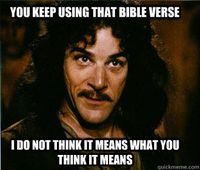That verse you love may not mean what you think it means
Read More Looking Up
Read More Upward Glances
“Inconceivable!”
The mysterious masked man had not fallen to his death, once again defying Vizzini’s expectations.
This was the fourth time he had proclaimed the man in black’s actions were "inconceivable." Inigo’s response in the 1987 cult classic “The Princess Bride” has become one of the movie’s most recognizable lines: “You keep using that word — I do not think it means, what you think it means.”
“The Princess Bride” remains one of my favorite movies. It’s a sick-day staple in my house, and it seems like when either of my girls so much as coughs, Princess Buttercup magically appears on the television screen in my living room.
On one such day, I was scrolling through Instagram as Inigo Montoya uttered his most memorable line again.
The profile I was looking at cited Jeremiah 29:11, and the line took on a different and special context: “You keep quoting that verse. I do not think it means, what you think it means.”
 There are a few verses we love as American Christians: Philippians 4:13; 2 Chronicles 7:14; Romans 8:28; 2 Corinthians 5:17 and Revelation 3:20, just to name a few. We quote others partially, without knowing where they are, such as “Judge not!”
There are a few verses we love as American Christians: Philippians 4:13; 2 Chronicles 7:14; Romans 8:28; 2 Corinthians 5:17 and Revelation 3:20, just to name a few. We quote others partially, without knowing where they are, such as “Judge not!”
But we rarely pay attention to the context of these verses. If we did, we would probably not use them quite as often. And — quoted in the proper context — these verses would have a much deeper meaning, when we did quote them.
I’d like to invite you to take a deep dive into those verses we love, to figure out if they really mean what we think they mean, or, if familiarity has worn down a much sharper message, which we need for our walk with Jesus.
To find that meaning, we must examine context.
Context is all the information that surrounds any given idea. This includes the words that precede and follow a word, phrase or sentence. It also includes the time period, and culture, in which the text was recorded, the audience to whom it was originally written, contemporary historical events, and even the author's and audience’s respective geography.
In seminary, we learned aphorisms like, “Context is King,” and “Any text without context is a pretext.” When you want to understand the Bible well, context is vitally important. Normally, any problem in understanding a single verse is solved by reading the whole chapter, the chapter before and the chapter after.
Let me give you an obvious example of the clarity context offers. In Luke 19:27, Jesus said, “But those enemies of mine who did not want me to be king over them — bring them here and kill them in front of me.”
By itself, it would seem I need to adopt a more violent approach to ministry. But what happens to the meaning of the verse when we put it in context?
Luke 19:11 says, “While they were listening to this, he went on to tell them a parable, because he was near Jerusalem, and the people thought that the kingdom of God was going to appear at once.” Jesus continued with a story about a king whose servants did not serve him as he expected. Jesus concluded the story in Luke 19:26-27: “[The king] replied, ‘I tell you that to everyone who has, more will be given, but as for the one who has nothing, even what they have will be taken away. But those enemies of mine who did not want me to be king over them — bring them here and kill them in front of me.’” In context, we can plainly see that Jesus was not ordering the death of his critics. He was quoting a character in a parable.
Much could be claimed about God from the Bible when we fail to consider context. This is how most Christian cults are formed. They take a verse out of context, and make it walk on all fours. Great spiritual damage has been done over the past 2,000 years by believing the apparent claim of a verse, independent of its context.
So take that verse you quote all the time, and read it in context. See what new meaning that text will hold for you.
In this series, we are going to consider “That Verse You Love” in its context, in order to discover what it’s really saying.
It may sting a little, but I invite you to lean into it, and push through, to discover something deeper and more foundational in your walk with Jesus.
